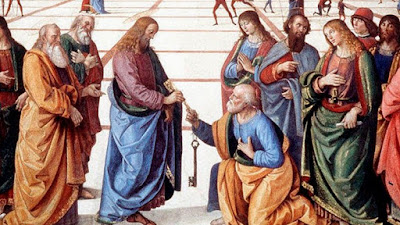Homily for the 21st Sunday in Ordinary Time, August 23, 2020, Year A
Fr. René J. Butler, M.S.
La Salette Missionaries of North America
Hartford, Connecticut
The questions in today’s Gospel, on the other hand, are far from irrelevant.
Can you imagine a head of state or a pope asking his closest associates, “Who do people say that I am?” The more normal question would be, “What are people saying about me?”
The disciples felt no need, apparently, to ask what Jesus meant, and they gave precisely the kind of answer he was looking for: “Some say John the Baptist, others Elijah, still others Jeremiah or one of the prophets.” (How anyone could think he was John the Baptist, whose death was so recent, is beyond me.)
When Jesus asked the disciples the more pointed question, “Who do you say that I am?” again they understood, and Simon responded accordingly, “You are the Christ, the Son of the living God.”
It is amazing how many different answers are given today to this question. Over the years I have seen articles in print or on-line making some interesting claims.
Some argue that Jesus was a married man, because men in his day were expected to marry, and the Gospels never say that he was not married. (Mary Magdalen is usually the most like candidate as his wife.) My first encounter with this position was published by a former priest arguing for married clergy.
Or: Jesus was a vegetarian. This idea is supported, among others, by the scene of Jesus casting out the sellers, which is interpreted as showing that Jesus was opposed to animal sacrifice. This is from an author associated with a group called “Denver Vegans.” (I have seen a stained-glass window depicting the same Gospel scene, and on the ground, among the spilled coins, are Bingo cards! There was no doubt about that pastor’s position on fund-raising options.)
There is even a book, published in 2003 by the Law and Business Institute, with the following title: Judith Christ of Nazareth: The Gospels of the Bible, Corrected to Reflect that Christ was a Woman. Unlike the previously mentioned articles, the authors make no attempt to justify their claim from Scripture.
As you can imagine, there are similar positions taken by various other interest groups, each claiming Jesus as one of their own.
In a way, that is a compliment to him. It shows how important it is to believers to have Jesus “on their side.” One could even claim that Simon’s response was similar. Who was “the Christ,” after all? In Hebrew the word is “Messiah,” and the Messiah was the one who would ultimately “restore the kingdom to Israel” (Acts 1:6). Who could be more desirable as “one of ours” for the Jewish people?
Simon’s statement could perhaps be seen as politically self-serving, except that Jesus says, “Blessed are you..., flesh and blood has not revealed this to you, but my heavenly Father.”
In all of the above, I am not actually interested in getting involved in any controversies. I have neither the time nor the temperament for that. What I am fascinated by, today at least, is Jesus’ response to Simon.
After Simon, under divine inspiration, has named Jesus correctly as the Christ, Jesus repays the compliment. In effect he says, you have told me who I am, now I will tell you who you are: “You are Peter.” The name means Rock. The interpretation of this name varies, naturally, according to the presuppositions and/or desires of those interpreting it.
Shortly in the Creed we will profess our faith in Jesus: Lord, Son of God, born of a virgin, risen from the dead, etc.
Imagine Jesus saying to you after that, “Thank you for your expression of faith, and for recognizing me for who I am. Now let me tell you who you are.”
What does he say next?

Comments